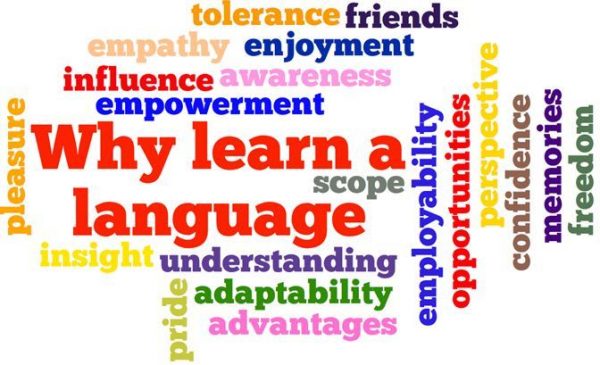La importancia de aprender lenguas y por qué las estudiamos
(English version below)
Las lenguas hacen que el mundo funcione. Han desarrollado y cambiado con el tiempo. Al principio sólo había una lengua; el idioma del cuerpo. La gente tenía que mostrarlo que quería usando sus manos (para demostrar) en vez de sus palabras. Nadie podía hablar, pero, eventualmente, nuestras lenguas empezaron a mejorar y nos permitieron formar frases. Desde entonces, hemos usado esa habilidad para comunicar, intercambiar y expresar lo que estamos sintiendo.

Los idiomas son una parte vital de nuestra comunidad mundial. ¡No podríamos sobrevivir sin ellos! Sin embargo, muchas personas no piensan que necesitan aprender otra lengua, pero no es verdad; es necesario que los aprendamos. Creen esto porque pueden hablar el idioma internacional (Inglés) pero si le pidieras a alguien que sabe hablar inglés tanto como otro idioma, te diría que todas las lenguas son útiles y saber más sólo puede ayudarte. También a pesar de la creencia común, la mayoría del mundo puede hablar al menos dos idiomas ¡Qué sorpresa! De hecho, sólo el 40% de la población es monolingüe. Según las estadísticas de iLanguages:
- 40% (Monolingües)
- 43% (bilingües)
- 13% (trilingües)
- 3% (multilingües – alguien que sabe hablar más de dos idiomas, pero esta palabra se usa mayormente con personas que hablan cuatro idiomas fluidamente)
- <1% (poligloto – alguien que tiene una comprensión grande de muchas lenguas, a lo mejor de cinco o más)
(todos los porcentajes representan la población mundial)

Esto significa que (si solo hablas una lengua) estás debajo del promedio. Aunque a muchas personas no les importa esto y no es la razón por qué algunos pasan su tiempo aprendiendo lenguas. Luego ¿por qué la gente aprende lenguas? Hay muchas razones.
Principalmente para los jóvenes, te hace mejor que otros candidatos a la hora de buscar empleo. Aún si no piensas que vayas a tener que hablar más lenguas en tu futuro trabajo. Tener algo en que puedes confiar siempre es algo positivo. Nunca sabrás cuando necesites ser capaz de hacer algo que otros no puedan. Poder hablar más lenguas solo te da más ventaja y aumentará tus oportunidades de trabajo. También podrías vivir y hasta trabajar en otros países. Sin embargo, no hay ‘tiempo para aprender lenguas’, no te sientes que has perdido tu oportunidad; es una actividad para todo el mundo.
Al entender otro idioma comprenderás el tuyo mucho más. Yo no sabía lo que era el subjuntivo antes de que comenzase a aprender español. Aprendí como usar el punto y coma y la diferencia de ‘who’ y ‘whom’ en inglés de estudiar latín. He obtenido tanta información de otras lenguas, especialmente los términos especializados.

Son deportes para la mente. Si estás aprendiendo una lengua deberías saber que es muy difícil recordar todo el vocabulario y a veces puede estresarte. Esto es porque tu mente está tratando de trabajar como si todo fuera inglés. Cuando aprendimos nuestra primera lengua, nosotros asociamos una palabra con un objeto y la recordaremos como eso es lo que siempre ha sido. Por lo tanto, la razón por la que no se nos olvidan las palabras en inglés, es porque reconocemos el objeto con esa palabra distinta. Cuando aprendes otro idioma asocias una segunda palabra con el mismo objeto. El objeto no siempre ha sido esta palabra nueva y naturalmente el cerebro regresará a la original (si hubieras aprendido dos lenguas desde el nacimiento, habrías identificado un objeto con dos palabras a la vez; por eso ambos son ‘los originales’). Así que olvidamos palabras. Con el tiempo esto no ocurrirá. Esto te mejorará la memoria y te hará ejercicio a la mente. Las lenguas activan muchas partes del cerebro y lo hacen más fácil hacer cosas sin relación. Por ejemplo, tu capacidad de atención aumentará. Es casi como otra forma de meditación. Se describe como una habilidad transferible porque te ayuda a desarrollar tu capacidad de solucionar problemas. Las lenguas son como rompecabezas: te fastidian, pero cuando las entiendes encajan bien. No puedes empezar del medio. La gramática y el vocabulario sólo son partes de un objeto que debes construir.
La razón más obvia es que las lenguas te permiten conocer a nuevos amigos. Con sólo una lengua estás restringido, pero con más: puedes hablar con muchas personas con quien no podías antes. Te ayudarán a entender a la gente y la cultura de una zona. Como Nelson Mandela dijo: ‘Si hablas con un hombre en un idioma que entiende, va a su cabeza. Si le hablas en su propio idioma, le llega al corazón.’ Si estudiases la cultura de otro país, ganarías una mejor comprensión de la tuya.

Si no tienes mucha confianza, las lenguas podrían ser el comienzo para tí. Cuando hablas en otra lengua tienes que pensar mucho más. Tienes que practicar en una variedad de caminos incluso hablar con personas. Probablemente es uno de los mejores caminos por mejorar tu confianza. Todo el mundo se equivoca a veces y la gente (de otro país) te respetaría por tratar de comunicarte (de la misma manera que elogiarías a alguien si estuviese tratando de hablarte en inglés).
Cuando vives en un país donde el idioma es el tuyo, puede parecer que aprender una lengua es totalmente inútil. Pero no es la verdad. Una vez que hayas aprendido una, a ti nunca se te olvidará porque querrás recordarla. Las ventajas de aprender una lengua aún si nunca vas a usarla en tu país son:
- Podrías hacer conversación en secreto con tus amigos.
- Se puede usar para impresionar a la gente alrededor de ti.
- Te da una gran sensación de logro.
Para mí la razón más importante es que las lenguas son asombrosas. Cuando oigo hablar a dos personas en otra lengua, estoy asombrado. Ojalá pudiera hacerlo. Estoy seguro de que todo el mundo siente lo mismo (aún si no le gusta la idea de aprender lenguas) No hay razón para no aprenderlas. Algunas personas dicen que malgasta tanto tiempo, pero yo creo que es un pasatiempo. Una vez que empieces, lo amarás. Verás lo divertido que puede ser. Encontrar diferencias en las lenguas se hará divertido. Por ejemplo, recientemente aprendí que la palabra ‘brilliant’ en inglés se deriva de ‘brillar’ en español. ‘brillante’ es un tipo de adjetivo que se forma por remover ‘ar, er o ir’ y añadir ‘ante o iente’ (y se traduce como ‘ing’ en inglés). Por lo tanto, la palabra ‘brilliant’ de verdad significa ‘shining’. Cosas pequeñas así hacen que entiendas tu propia lengua mejor.
Todo lo que tienes que hacer es: ser abierto y darles la oportunidad. La importancia de aprender lenguas es enorme, siempre habrá un deseo para personas que hablan dos lenguas en la mayoría de trabajos. Los idiomas pueden entrenar tu cerebro para que puedas trabajar mejor y más rápido. Si no aprendiéramos lenguas, el mundo no sería una comunidad sino muchas comunidades. Nos perjudicaría porque habría más discriminación y nadie podría relacionarse con otras culturas. Son algunas de las cosas más útiles que se ensenan y es tan guay pensar que hoy en día existen más de 7.000 lenguas. Ojalá yo te haya ayudado a darte cuenta por qué estudiar lenguas es necesario.

The Importance of Learning Languages and Why We Study Them
Languages make the world work. They have developed and changed over time. At the beginning there was only one language; the language of the body. People had to show what they wanted by using their hands (to demonstrate) rather than words. No one could speak, but, eventually, our tongues began to develop and allowed us to form phrases. Since then, we’ve used that ability to communicate, trade and express what they are feeling.
Languages are a vital part of our global community. We could not survive without them! However, many people do not think that they need to learn another language, but that’s not true; it is necessary for us to learn them. They believe this because they can speak the international language (English) but if you asked someone who knows how to speak English as well as another language, they would say that all languages are useful and knowing more can only help you. Also, despite common belief, most of the world can speak at least two languages. In fact, only 40% of the population is monolingual. According to statistics from iLanguages:
- 40% (monolingual)
- 43% (bilingual)
- 13% (trilingual)
- 3% (multilingual – someone who can speak more than two languages, but this word is used mostly with people who speak four languages fluently)
- < 1% (polyglot – someone who has an understanding of many languages, maybe five or more)
(all percentages represent the world’s population)
This means that (if you speak only one language) you are below average. Although many people don’t mind this and it is not the reason why some spend their time learning languages. Then why people learn languages? There are many reasons.
Mainly for young people, it makes you better than other candidates in seeking employment. Even if you don’t think you are going to have to speak more languages in your future work. It is a good thing to have something that you can always rely on. You never know when you may need to be able to do something that others cannot. Speaking more languages only gives you more advantages and increases your job opportunities. Also, you could live and still work in other countries. However, there is no ‘time to learn languages’, don’t feel that you’ve missed your chance; it is an activity for everyone.
Upon understand another language you’ll understand yours much more. I didn’t know what the subjunctive was before I started to learn Spanish. I learned how to use the semicolon and the ‘who’ and ‘whom’ difference in English from studying Latin. I’ve learnt so much information from other languages, especially the special terms.
They are sports for the mind. If you’re learning a language you should know that it is very difficult to remember all the vocabulary and can sometimes get you stressed. This is because your mind is trying to work as if everything were English. When we learned our first language, we associated a Word with an object and we will remember it as that because that is what it always has been. Therefore, the reason why we don’t forget words in English is because we recognize that object with a specific word. When you learn another language, you associate a second word with the same object. The object has not always been this new word and naturally the brain will return to the original (if you had learned two languages from birth, you would have identified an object with two words at the same time; so they are both ‘Originals’). Therefore, we forget words. Over time this will not happen. This will improve your memory and will exercise your mind. Languages enable many parts of the brain and make it easier to do unrelated things. For example, your attention span will increase. It’s almost like another form of meditation. It is described as a transferable skill because it helps you to develop your ability to solve problems. Languages are like puzzles: they annoy you, but when you understand them they fit well. You cannot start from the middle. Grammar and vocabulary are only parts of an object that you build.
The most obvious reason is that languages allow you to meet new friends. With only one language you are restricted, but with more: you can talk to many people who you could not before. They will help you to understand the people and culture of an area. As Nelson Mandela said: ‘ If you speak to a man in a language that he understands, it goes to his head. If you talk to him in his own language, it goes to his heart.’ If you were to study the culture of another country, you would earn a better understanding of your own.
If you don’t have confidence, languages could be the beginning for you. When you speak in another language, you have to think about it much more. You have to practice in a variety of ways including: talking to people. It is probably one of the best ways to improve your confidence. Everyone is wrong at times and people (from another country) would respect you for trying to communicate (in the same way that you would respect someone for trying to talk to you in English).
When you live in a country where the language is yours, it may seem that learning a language is totally useless. But that’s not true. Once you’ve learned one, you will never forget it because you’ll want to remember it. The advantages of learning a language even if you are never going to use it in your country are:
- You could have secret conversations with your friends.
- You can use it to impress people around you.
- It gives you a great feeling of achievement.
For me the most important reason is that languages are amazing. When I hear two people in another language, I am amazed. I wish I could do it. I am sure that everyone feels the same (even if you don’t like the idea of learning languages) there is no reason to not learn them. Some people say that it wastes so much time, but I think it is a hobby. Once you start, you will love it. You will see how much fun that it can be. Finding differences in the languages will be interesting. For example, I recently learned that the English word ‘brilliant’ is derived from ‘Brillar’ (Shine) in Spanish. “brilliante” is a type of adjective that is formed by removing ‘ar, er or ir’ and adding ‘ante or iente’ (and translates as ‘ing’ in English). Therefore, the word ‘brilliant’ means ‘shining’. Little things will help you understand your own language better.
All you have to do is: be open and give them a chance. The importance of learning languages is huge, there will always be a desire for people who speak two languages in the majority of jobs. Languages can train your brain so you can work better and faster. If we do not learn languages, the world would not be one community but many communities. It would harm us because there would be more discrimination and nobody could relate to other cultures. Languages are some of the most useful things that we are taught and it is so cool to think that there are more than 7,000 languages existing today. I hope I have helped you realize why studying languages is necessary.
